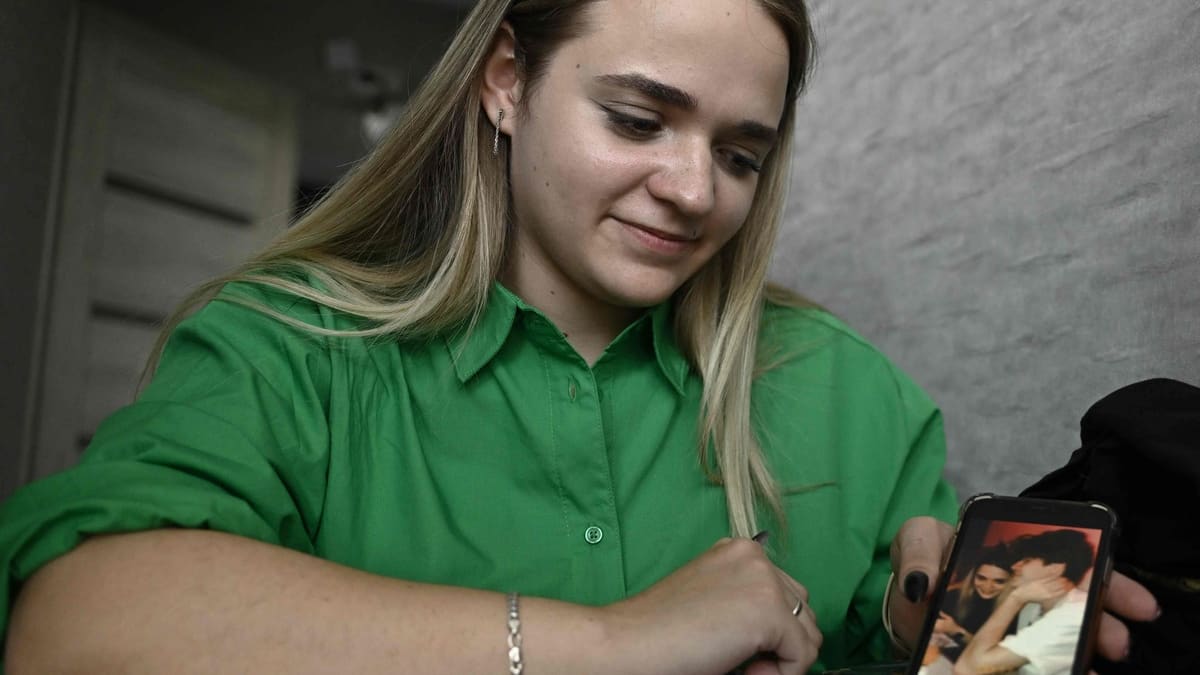
Erika, 20, lost her husband at the front, just like Darina, 21. Katya’s fiancé, 22, was also killed in the fighting. The Russian invasion of Ukraine has left behind widows whose adult lives have not yet begun.
• Read also: Ukraine: Nine injured in an oil pipeline fire
Erika Martynyuk and Savely Fidan, 21, were married in February, the day before the young man, a student at the Odessa Military Academy, left for the front.
Like many other Ukrainians, it was the Russian invasion that prompted them to formalize their relationship.
“We were afraid of losing each other,” explains Erika, a chemistry student in Kiev. Since then, the couple has only been together for about five days.
Savely, a unit commander in the 46th Assault Brigade, emerged alive from the bloody battle of Bakhmut, but was killed on August 27 in the Zaporizhia region. He was identified as disfigured by his tattoos.
“When I saw his photos in the Zaporizhzhya morgue, it was as if I had died too,” says the young woman, wearing a black T-shirt that reads “Be a Warrior, Live Forever,” a gift from her husband. . “I no longer have a goal, and I no longer have dreams.”
She continues to send him letters every day and wants to become a medic at the front.
“Maybe I can save someone else,” hopes Erika, her delicate makeup contrasting with her husband’s military shoulder bag that she always carries with her.
The relatively quiet life in Kiev makes her “crazy”: “People are walking around, laughing and talking about the evenings. And I’m going to the cemetery.
Ukraine did not reveal the number of its soldiers who fell on the front or their ages.
But according to Oksana Burkun, co-founder of the Association for Women Who Have Lost Husbands or Partners, 7% of the nearly 2,000 members of her Facebook community are between 18 and 24 years old.
Ms. Bourcon testifies that these young women sink “into complete despair.”
“Older women have kids, errands to do, work. Something they can hold on to (…) Young women, they completely fall apart,” some of whom end up being hospitalized, she says.
Those close to them sometimes lack tact when trying to console them. “They tell them things like, ‘You’re still young, you’ll find someone else,’ or even push them to ‘get to know someone.'” The result: young widows withdraw into themselves, Burkun says.
For Erika, the only people who really understand her are two other young women who lost comrades at the front and do not try to reassure her. “They say unequivocally: ‘No, it’s not going to work, you’re going to be in pain for a very long time and you won’t know what to do,'” she says.
Darina, another young widow, admits that she “faces great difficulties in maintaining her social contacts,” except at school where she teaches English.
Japanese philology student Igor Voevodin, code name Stitch – after an alien from a Disney movie – became a sniper at the age of 20 in the Azov Brigade of the Ukrainian National Guard after the Russian invasion began, despite pressure from his family. Attempts to dissuade him. He died on August 20, less than a month after the wedding.
Darina buried him, took his last name, and got a tattoo of Stitch.
But she still cannot accept her death.
“I still think he’s busy and will be back soon,” says the long-haired young woman, hiding her trembling hands.
She vowed to fulfill their dreams together: a luxury car and a house by the sea.
Sergey Kvit, rector of the prestigious Kyiv-Mohyla Academy University, where at least five students died at the front, sees these young Ukrainians fighting for “dignity and justice” and “building” their country’s future.
“This war is a very hard blow to our generation,” says Darina. “After the war, we will have a lot of problems, because the best and most enthusiastic will be killed.”
“So many men die and nothing changes. How long will this last?” Erika asks through tears.
As she spoke to the AFP team in a park in Kiev, her friend Katya was waiting for her. Her fiancé died in fighting two days ago. The next day, the two young women will go to his funeral.






